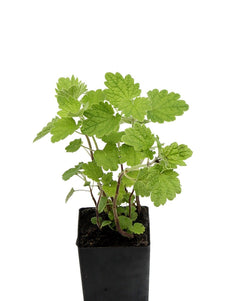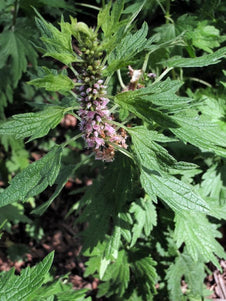









Motherwort
Motherwort

- Low stock - 9 items left
- Inventory on the way

Usually available: All year
Life cycle: Perennial
Height: 60cm - 1m
Position: Sun / part shade
Soil preference: Well drained
This is how we pack and send your Herb Plants to all states except TAS & WA
You will receive
- 1 Motherwort Herb Plant in a 50 X 75mm tube - General growing instructions
All of our Herb Plants are grown organically with certified organic potting mixes and fertilizers
Botanical Name: Leonurus cardiaca
Motherwort is an herbaceous perennial growing 60cm to 1 meter high, but may get up to 120cm in good conditions. The tall and large stems come up from the ground, branch down lower on the plant and then become tall stalks. They are square, covered in short hairs and often tinged with purple near the nodes. The dark green leaves are very distinctive, hanging off long petioles like upside down crowns. The palmate leaves are held opposite each other, have serrated edges, and deeply cut lobes. At the base of the plant the leaves have 3 points, while higher up they have 5 lobes coming to a point. The veins are prominent and the surface of the leaf is textured. The pink to lilac flowers bloom in mid-summer and are held on the leaf axils on the uppermost part of the plant. They have 3 lobed bracts and the calyx is bell shaped, with an 8-12mm corolla, with dense hair coverage on the tips.
Motherwort is a member of the mint family, Lamiaceae. The botanical name Leonurus cardiaca is derived from the Greek word for lion ‘leon’ and for tail ‘ouros’, referring to the apparent resemblance of the flowering plant to a lion’s tail. The species name ‘cardiaca’ refers to its use as a heart tonic. The common name Motherwort is a reference to the plant’s use by midwives and to the old word ‘wort’, meaning ‘to heal’. Other common names include Throw-wort, Lion’s Ear, Wild Dagga and Lion’s Tail. It is worth noting that Lion’s Ear is also the common name for Leonotis nepetifolia and Lion’s Tail a common name for Leonotis leonurus, both related plants.
Motherwort is native to Central Asia and south eastern Europe, but it has now spread worldwide due to its popularity. Usually it prefers to grow near water or in damp areas as undergrowth. In these regions it has been cultivated for use by locals since ancient times. It has a pungent odour and a bitter taste.
Growing Conditions
Motherwort prefers a partly shaded position for best results. In its native environment Motherwort prefers to grow in gravelly ground, so rocky and open soils will be well suited to this plant. However, most soil types will be suitable as long as they are well drained. This is a very hardy plant once established.
This plant is difficult to grow from seed as the seeds require stratification, if it is not cold enough in your garden, before they will germinate. To prevent self sowing, cut the flowers back so that they do not have a chance to develop seeds. To propagate, the plant’s root ball can be divided in autumn.
Medicinal Uses
Motherwort has a long history of traditional medicinal use from the time of the Ancient Greeks and Romans. It contains the chemical leonurine, which is a mild vasodilator and has a relaxing effect on smooth muscles. It is used as a cardiac tonic, a general women’s tonic, for regulating the menstrual cycle, to stimulate and to pacify the nervous system. In Traditional Chinese Medicine, the related plant, Leonurus artemisia, is used for strengthening the heart, to promote longevity, promote blood circulation, to slow a fast heartbeat, to reduce swelling, as a diuretic and to reduce blood pressure. Essentially this plant was used to ‘heal the anxious heart and mind’.
Motherwort was used by early midwives as a women’s tonic and to assist with birth. However, it is considered to be unsafe for pregnant women due to the possibly of inducing uterine contractions. It is considered safe for use in the post-partum period to assist with recovery. People on heart medications should not take this herb without consultation as it may interfere with the actions of the medication.
Research has shown that there is some support for these traditional uses, but not enough to make solid claims of effectiveness. The whole plant may be used, with leaves harvested anytime or collected in summer and dried for later use. It is quite bitter tasting, so may be difficult to swallow, regardless of its benefits.
Culinary Uses
Motherwort is not known to be toxic in normal quantities, but the taste is very bitter and generally unsuitable for culinary uses.
All information provided on this website is for informational purposes only. Please seek professional advice before commencing any treatment.






